八年级英语人教版下册 Unit 5 What were you doing when the rainstorm came?Section A (1a-2d) 课件(共32张PPT)
文档属性
| 名称 | 八年级英语人教版下册 Unit 5 What were you doing when the rainstorm came?Section A (1a-2d) 课件(共32张PPT) | 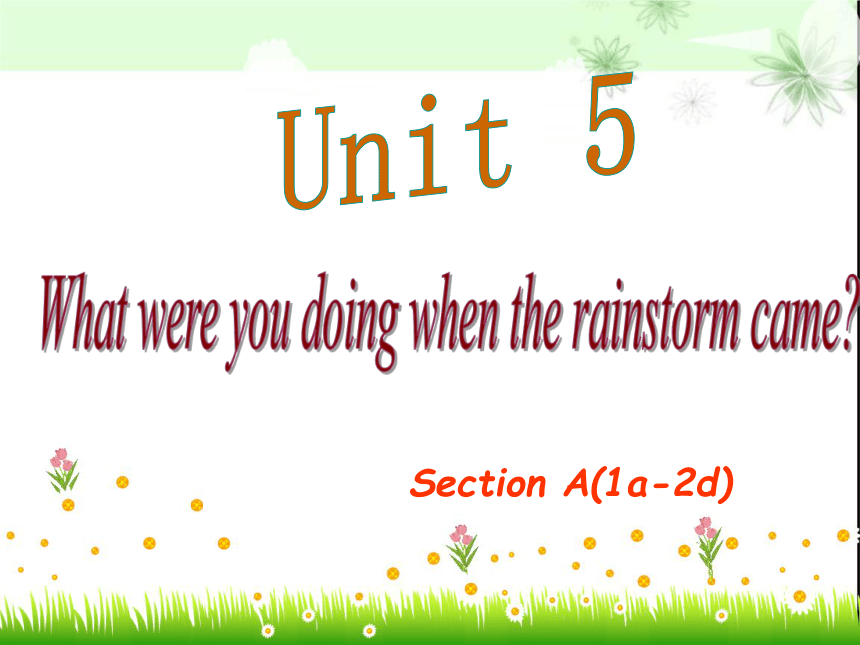 | |
| 格式 | zip | ||
| 文件大小 | 1.1MB | ||
| 资源类型 | 教案 | ||
| 版本资源 | 人教新目标(Go for it)版 | ||
| 科目 | 英语 | ||
| 更新时间 | 2023-02-15 19:06:15 | ||
图片预览

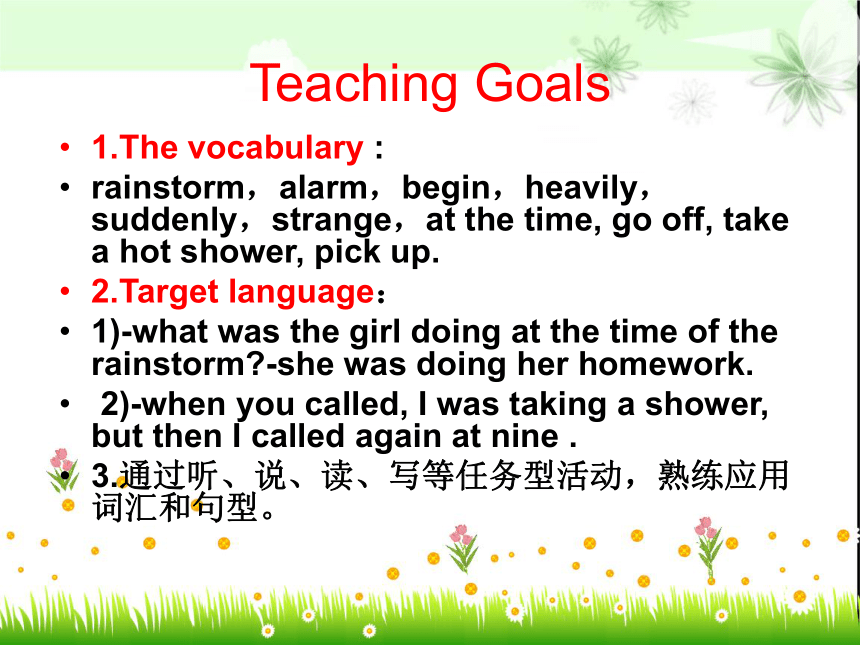
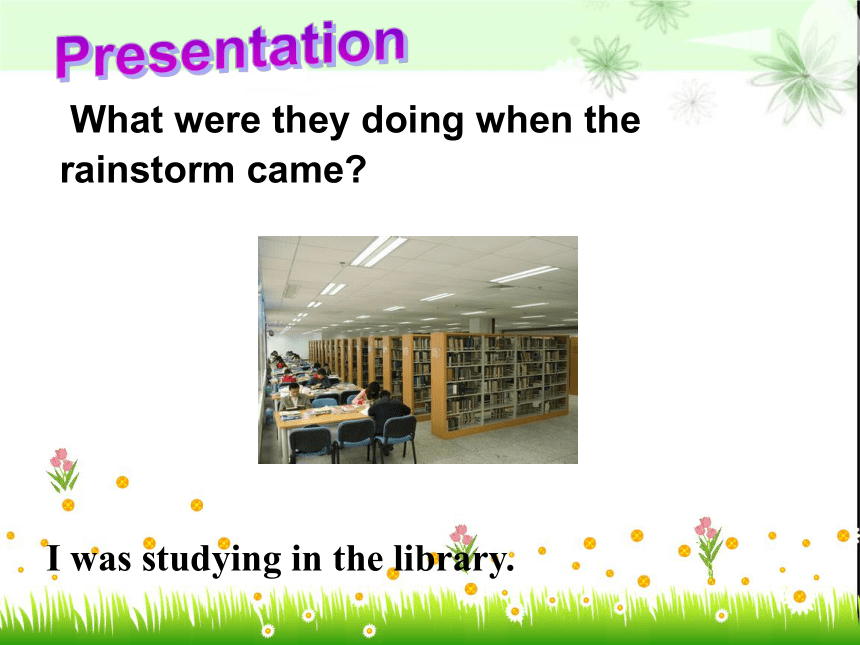
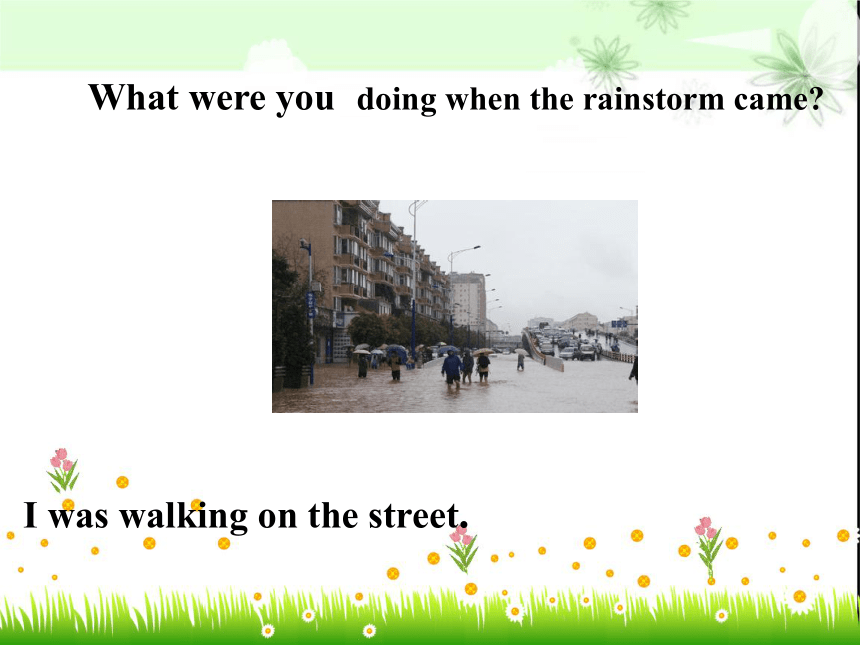
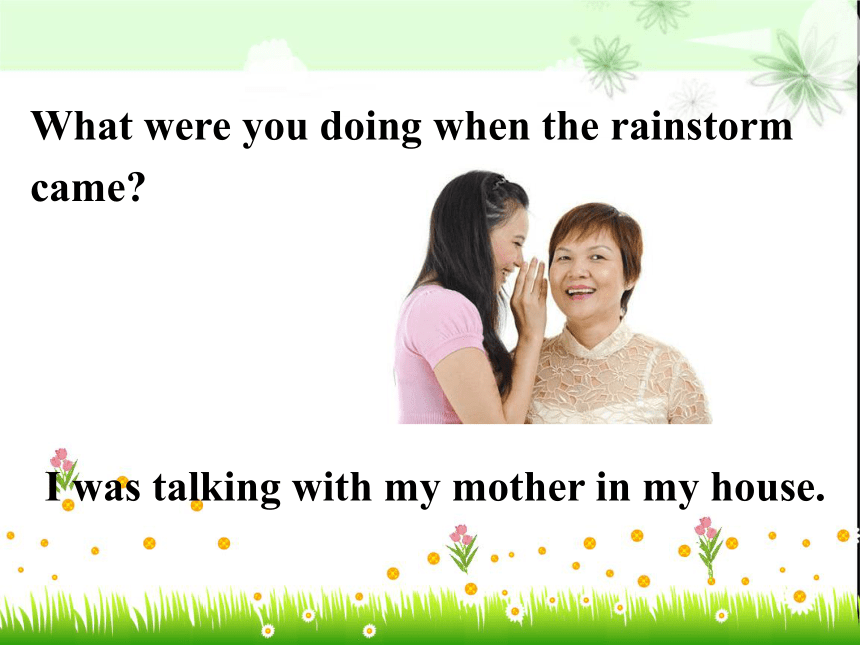
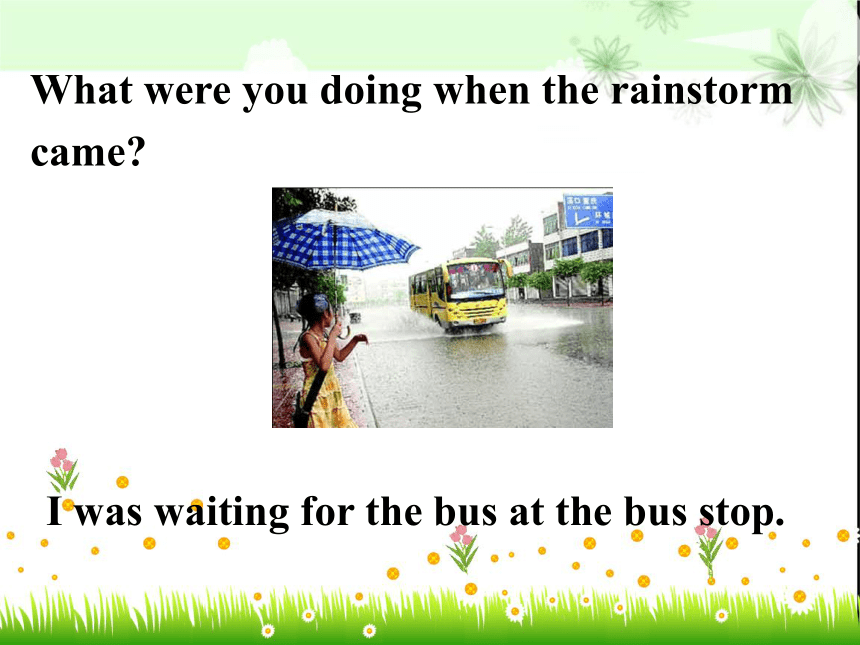
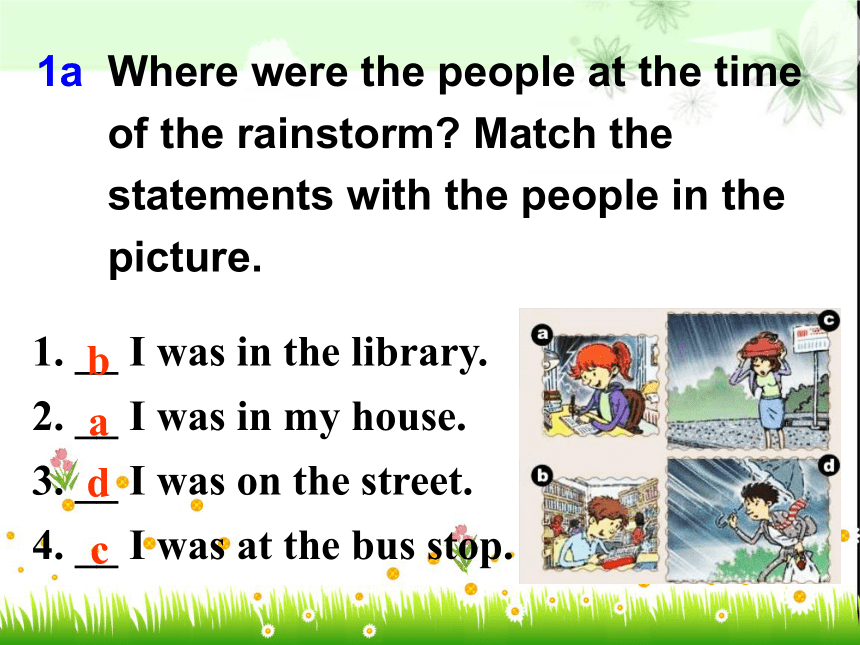
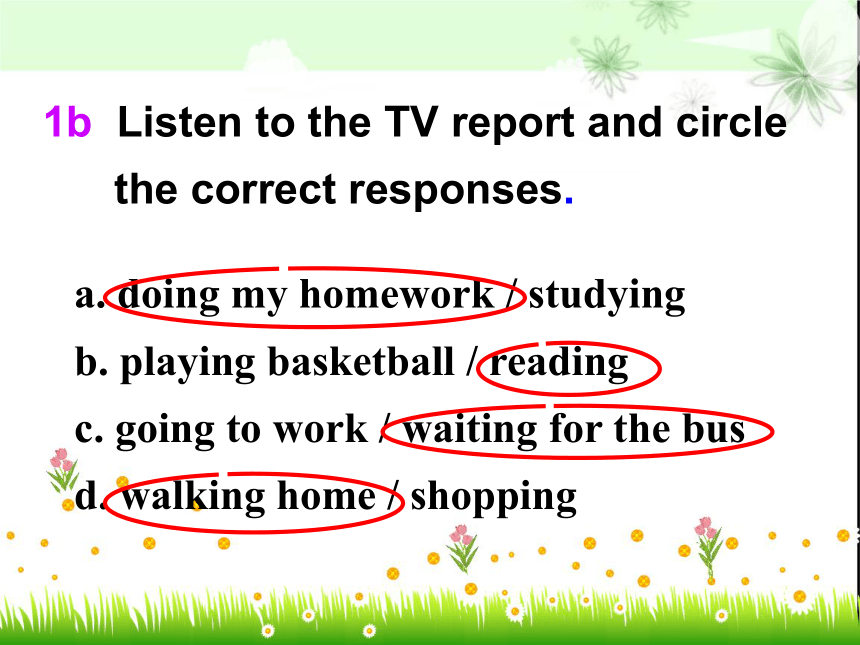
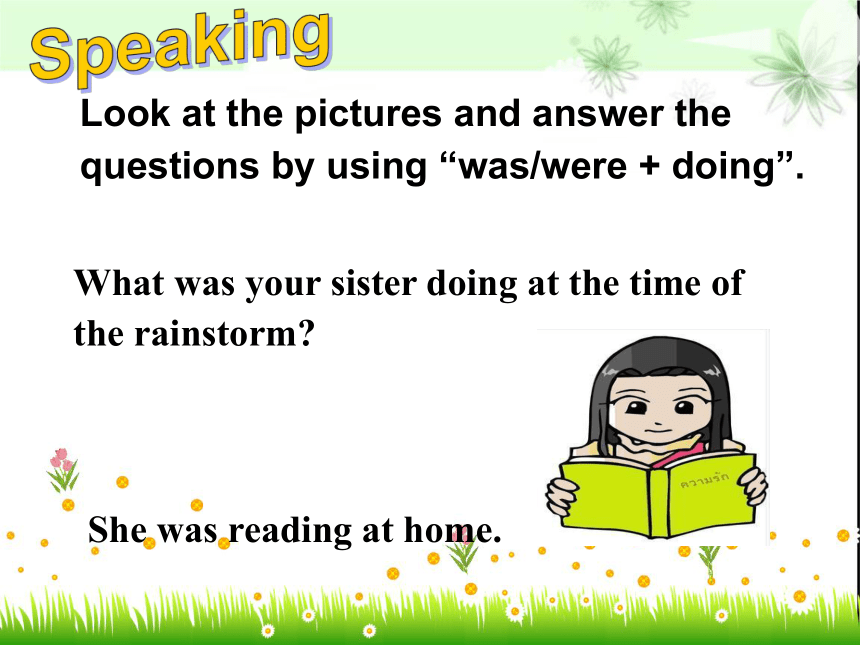
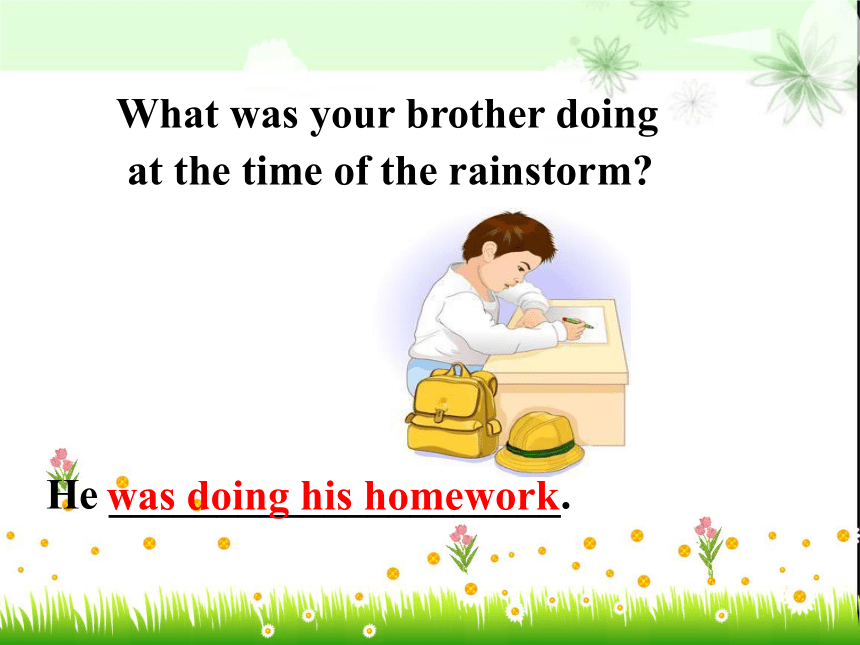
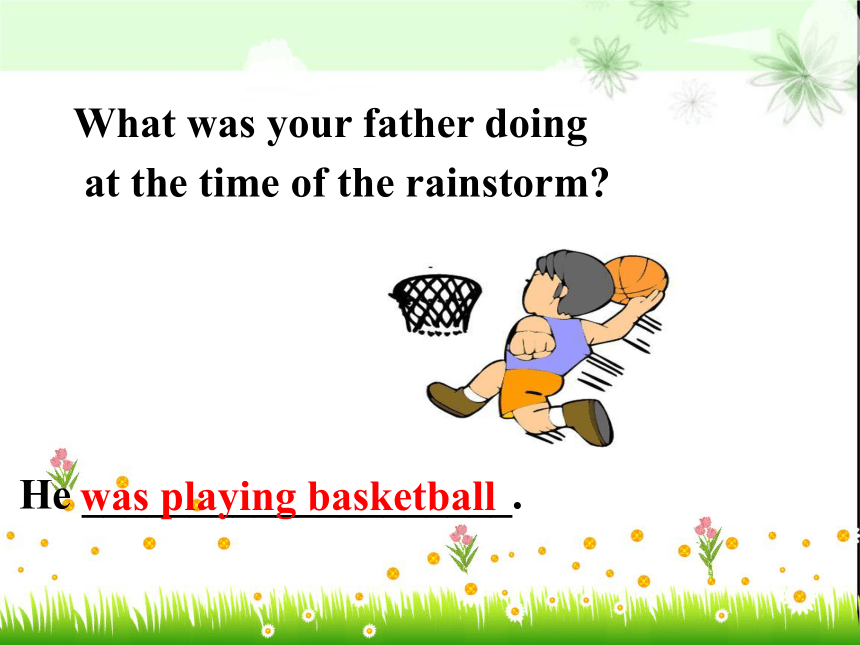
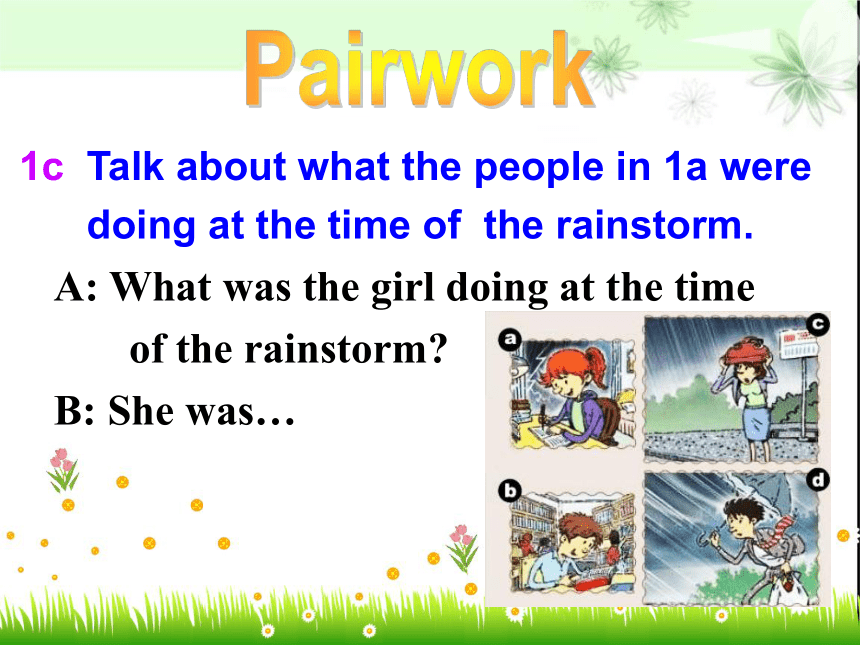
文档简介
(共32张PPT)
What were you doing when the rainstorm came
Unit 5
Section A(1a-2d)
Teaching Goals
1.The vocabulary :
rainstorm,alarm,begin,heavily,suddenly,strange,at the time, go off, take a hot shower, pick up.
2.Target language:
1)-what was the girl doing at the time of the rainstorm -she was doing her homework.
2)-when you called, I was taking a shower, but then I called again at nine .
3.通过听、说、读、写等任务型活动,熟练应用词汇和句型。
I was studying in the library.
What were they doing when the rainstorm came
Presentation
I was walking on the street.
What were you doing when the rainstorm came
I was talking with my mother in my house.
What were you doing when the rainstorm came
I was waiting for the bus at the bus stop.
What were you doing when the rainstorm came
1a Where were the people at the time
of the rainstorm Match the
statements with the people in the
picture.
1. __ I was in the library.
2. __ I was in my house.
3. __ I was on the street.
4. __ I was at the bus stop.
b
d
c
a
1b Listen to the TV report and circle
the correct responses.
a. doing my homework / studying
b. playing basketball / reading
c. going to work / waiting for the bus
d. walking home / shopping
She was reading at home.
Look at the pictures and answer the
questions by using “was/were + doing”.
What was your sister doing at the time of the rainstorm
Speaking
He _____________________.
What was your brother doing
at the time of the rainstorm
was doing his homework
He ____________________.
What was your father doing
at the time of the rainstorm
was playing basketball
1c Talk about what the people in 1a were
doing at the time of the rainstorm.
A: What was the girl doing at the time
of the rainstorm
B: She was…
Pairwork
Listening
2a Listen and number the pictures 1-5.
1
2
3
4
5
2b Listen again. Fill in the blanks
in the sentences in 2a.
I ____ so busy _______
for the umbrella that I didn’t see a car coming.
My alarm didn’t go off so I _______ up late.
I took a hot shower
and _________ some
warm food.
was
looking
ate
woke
I ____________ for the bus when it began to rain heavily.
I _____ to the bus stop but I still missed the bus.
was waiting
ran
2c Use the information in 2a to retell the
story in a conversation between the
boy and a TV reporter.
TV reporter: Tell us what happened yesterday
morning.
Boy: …
TV reporter: So, when the rainstorm
suddenly came, what were you doing
Boy: …
Speaking
2d Role play the conversation.
Linda: Oh, I was in the
kitchen helping
my mom.
Mary: What were you doing last night,
Linda I called at seven and
you didn’t pick up.
Linda: What was I doing at eight Oh,
I know. When you called, I was
taking a shower.
Mary: I see. I called again at eight and
you didn’t answer then either.
Mary: But then I called again at nine.
Linda: Oh, I was sleeping
at that time.
Mary: So early That’s strange.
Linda: Yeah, I was tired. Why did
you call so many times
Mary: I needed help with my
homework. So while you were
sleeping, I called Jenny and
she helped me.
1. My alarm didn’t go off so I woke up
late.
alarm n. 闹钟
e.g. What time will I set the alarm
for
我要把闹钟拨到几点钟响?
Language points
go off意为(闹钟)发出响声,还有(电灯)熄灭;离开;(食物)变坏等。
例如:My alarm clock didn’t go off.
我的闹钟没响。
The lights went off because of the storm.
这场暴风雨造成了停电。
2. I was waiting for the bus when it began to rain heavily.
1) begin v. (began) 开始
e.g. I’ll begin whenever you’re ready.
你什么时候准备好我就开始。
用法:
begin to do与begin doing
一般来说,begin to do和begin doing可
以互换,但在以下三种情况下,用to do。
主语不是指人,而是it等。
如:It began to rain.
begin后接表示心理活动的词。如:begin to know, 还有believe, wonder, think等词。
begin本身是ing形式时,为避免重复后接to do。
2) heavily adv. 在很大程度上;大量地
e.g. moving heavily 吃力地移动
It rained heavily. 雨下得很大。
3. So, when the rainstorm suddenly came, …
suddenly adv. 突然;忽然
e.g. I suddenly remembered that I had难题
locked the door.
我忽然想起我没锁门。
4. That’s strange.
strange adj. 奇特的,奇怪的;
不可思议的
e.g. a strange noise 奇怪的声音
How strange! There are no workers in the bank.
真奇怪!这家银行里没有工作人员。
5. I called at seven and you didn’t pick up.
pick up(=pick up the phone) 接电话
pick up 还有以下含义:
1) 拾起;捡起
e.g. Your pen is lying on the floor. Please pick it up.
你的钢笔掉在地上,请把他拾起来。
Pick that book up.
把那本书捡起来。
2) (开车) 接/载某人
e.g. I will pick you up the station .
我会在车站接你。
We’ll send the ambulance to pick him up.
我们要派一辆救护车把他接走。
Make a survey. Ask your partners
in your group what they were doing
at the following time. Fill in the form
and then give a report.
Speaking
Time Names doing
Yesterday 7:00 Tom reading
Peter shopping
Yesterday 8:00 Tom walking
Peter …
Yesterday 9:00 … …
Report: Tom was reading.
Peter was shopping…
A: What were you doing yesterday at 7:00
B : I was reading.
Summary
In this class we have learned Past Progressive Tense. You should master the new words and phrases . And practice the sentences in target language.
结束语
A little more effort, a little more success.
再多一点努力,就多一点成功.
What were you doing when the rainstorm came
Unit 5
Section A(1a-2d)
Teaching Goals
1.The vocabulary :
rainstorm,alarm,begin,heavily,suddenly,strange,at the time, go off, take a hot shower, pick up.
2.Target language:
1)-what was the girl doing at the time of the rainstorm -she was doing her homework.
2)-when you called, I was taking a shower, but then I called again at nine .
3.通过听、说、读、写等任务型活动,熟练应用词汇和句型。
I was studying in the library.
What were they doing when the rainstorm came
Presentation
I was walking on the street.
What were you doing when the rainstorm came
I was talking with my mother in my house.
What were you doing when the rainstorm came
I was waiting for the bus at the bus stop.
What were you doing when the rainstorm came
1a Where were the people at the time
of the rainstorm Match the
statements with the people in the
picture.
1. __ I was in the library.
2. __ I was in my house.
3. __ I was on the street.
4. __ I was at the bus stop.
b
d
c
a
1b Listen to the TV report and circle
the correct responses.
a. doing my homework / studying
b. playing basketball / reading
c. going to work / waiting for the bus
d. walking home / shopping
She was reading at home.
Look at the pictures and answer the
questions by using “was/were + doing”.
What was your sister doing at the time of the rainstorm
Speaking
He _____________________.
What was your brother doing
at the time of the rainstorm
was doing his homework
He ____________________.
What was your father doing
at the time of the rainstorm
was playing basketball
1c Talk about what the people in 1a were
doing at the time of the rainstorm.
A: What was the girl doing at the time
of the rainstorm
B: She was…
Pairwork
Listening
2a Listen and number the pictures 1-5.
1
2
3
4
5
2b Listen again. Fill in the blanks
in the sentences in 2a.
I ____ so busy _______
for the umbrella that I didn’t see a car coming.
My alarm didn’t go off so I _______ up late.
I took a hot shower
and _________ some
warm food.
was
looking
ate
woke
I ____________ for the bus when it began to rain heavily.
I _____ to the bus stop but I still missed the bus.
was waiting
ran
2c Use the information in 2a to retell the
story in a conversation between the
boy and a TV reporter.
TV reporter: Tell us what happened yesterday
morning.
Boy: …
TV reporter: So, when the rainstorm
suddenly came, what were you doing
Boy: …
Speaking
2d Role play the conversation.
Linda: Oh, I was in the
kitchen helping
my mom.
Mary: What were you doing last night,
Linda I called at seven and
you didn’t pick up.
Linda: What was I doing at eight Oh,
I know. When you called, I was
taking a shower.
Mary: I see. I called again at eight and
you didn’t answer then either.
Mary: But then I called again at nine.
Linda: Oh, I was sleeping
at that time.
Mary: So early That’s strange.
Linda: Yeah, I was tired. Why did
you call so many times
Mary: I needed help with my
homework. So while you were
sleeping, I called Jenny and
she helped me.
1. My alarm didn’t go off so I woke up
late.
alarm n. 闹钟
e.g. What time will I set the alarm
for
我要把闹钟拨到几点钟响?
Language points
go off意为(闹钟)发出响声,还有(电灯)熄灭;离开;(食物)变坏等。
例如:My alarm clock didn’t go off.
我的闹钟没响。
The lights went off because of the storm.
这场暴风雨造成了停电。
2. I was waiting for the bus when it began to rain heavily.
1) begin v. (began) 开始
e.g. I’ll begin whenever you’re ready.
你什么时候准备好我就开始。
用法:
begin to do与begin doing
一般来说,begin to do和begin doing可
以互换,但在以下三种情况下,用to do。
主语不是指人,而是it等。
如:It began to rain.
begin后接表示心理活动的词。如:begin to know, 还有believe, wonder, think等词。
begin本身是ing形式时,为避免重复后接to do。
2) heavily adv. 在很大程度上;大量地
e.g. moving heavily 吃力地移动
It rained heavily. 雨下得很大。
3. So, when the rainstorm suddenly came, …
suddenly adv. 突然;忽然
e.g. I suddenly remembered that I had难题
locked the door.
我忽然想起我没锁门。
4. That’s strange.
strange adj. 奇特的,奇怪的;
不可思议的
e.g. a strange noise 奇怪的声音
How strange! There are no workers in the bank.
真奇怪!这家银行里没有工作人员。
5. I called at seven and you didn’t pick up.
pick up(=pick up the phone) 接电话
pick up 还有以下含义:
1) 拾起;捡起
e.g. Your pen is lying on the floor. Please pick it up.
你的钢笔掉在地上,请把他拾起来。
Pick that book up.
把那本书捡起来。
2) (开车) 接/载某人
e.g. I will pick you up the station .
我会在车站接你。
We’ll send the ambulance to pick him up.
我们要派一辆救护车把他接走。
Make a survey. Ask your partners
in your group what they were doing
at the following time. Fill in the form
and then give a report.
Speaking
Time Names doing
Yesterday 7:00 Tom reading
Peter shopping
Yesterday 8:00 Tom walking
Peter …
Yesterday 9:00 … …
Report: Tom was reading.
Peter was shopping…
A: What were you doing yesterday at 7:00
B : I was reading.
Summary
In this class we have learned Past Progressive Tense. You should master the new words and phrases . And practice the sentences in target language.
结束语
A little more effort, a little more success.
再多一点努力,就多一点成功.
同课章节目录
- Unit 1 What's the matter?
- Section A
- Section B
- Unit 2 I'll help to clean up the city parks.
- Section A
- Section B
- Unit 3 Could you please clean your room?
- Section A
- Section B
- Unit 4 Why don't you talk to your parents?
- Section A
- Section B
- Unit 5 What were you doing when the rainstorm came
- Section A
- Section B
- Review of Units 1-5
- Unit 6 An old man tried to move the mountains.
- Section A
- Section B
- Unit 7 What's the highest mountain in the world?
- Section A
- Section B
- Unit 8 Have you read Treasure Island yet?
- Section A
- Section B
- Unit 9 Have you ever been to a museum?
- Section A
- Section B
- Unit 10 I've had this bike for three years.
- Section A
- Section B
